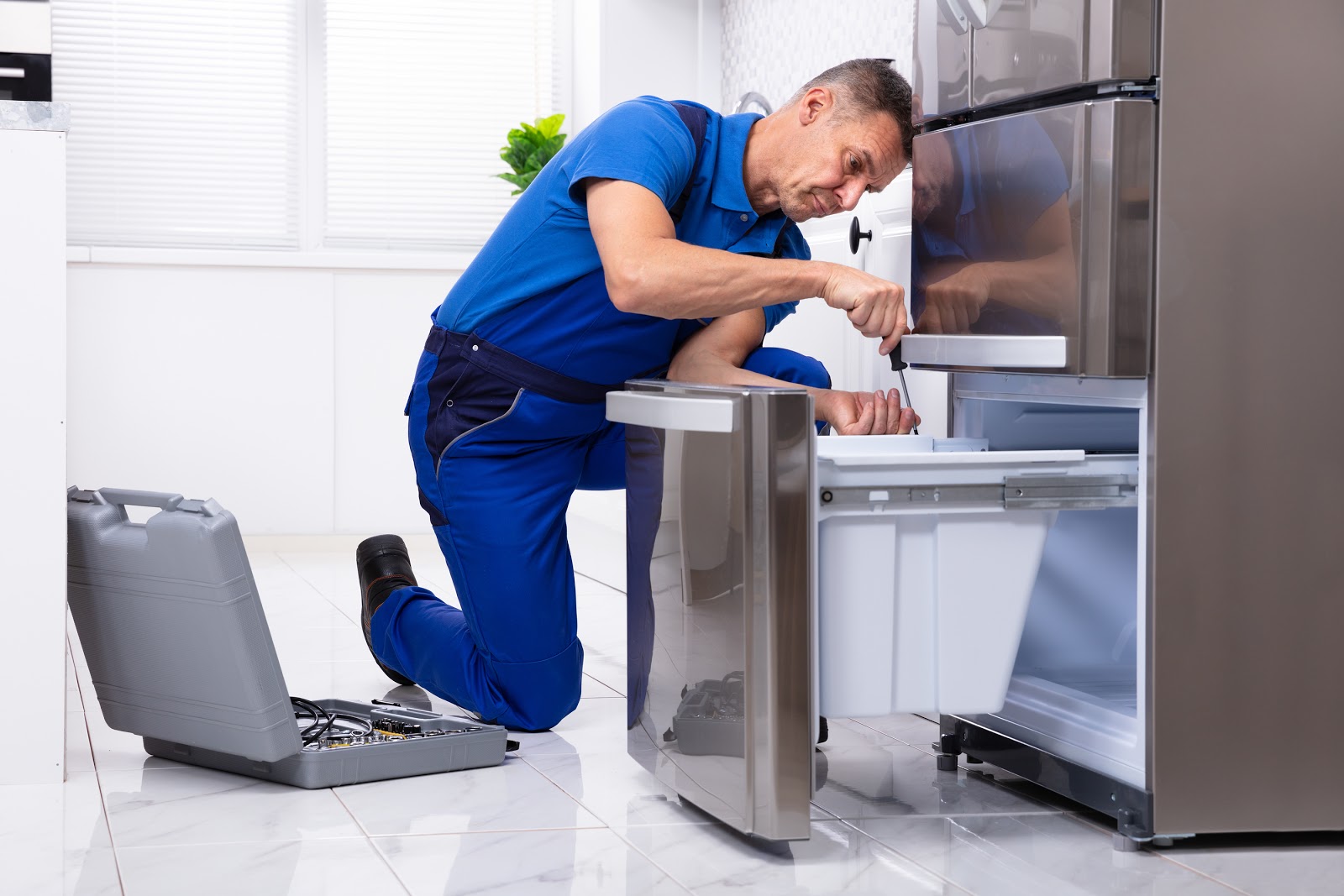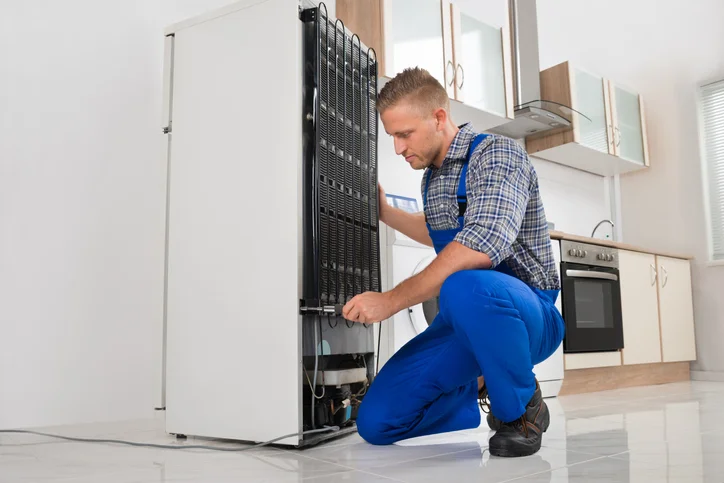Vital Tips for Effective Ref Repair Work to Expand Home Appliance Life-span
When it comes to your fridge, appropriate repair work and maintenance are crucial for longevity. Recognizing usual issues and knowing when to act can make all the distinction.
Comprehending Usual Fridge Issues
Refrigerators are necessary in keeping your food fresh, however they can run into a range of common issues that interrupt their efficiency. One frequent concern is inadequate air conditioning. If you see food spoiling quicker than typical, check the thermostat setups or think about if the door seals are harmed. One more common issue is excessive noise, which could indicate a malfunctioning compressor or a stopping working follower. You could also experience water pooling inside or below the refrigerator; this usually results from a stopped up defrost drainpipe or a malfunctioning water line. Furthermore, if your refrigerator's light isn't functioning, it can be a straightforward bulb issue or a trouble with the door button. Lastly, ice build-up in the fridge freezer can impede air movement and cooling down performance. Acknowledging these problems early can conserve you time and money out of commission, guaranteeing your refrigerator runs smoothly and successfully.
Normal Maintenance Practices
To maintain your devices running efficiently, you need to remain on top of normal upkeep practices. Clean the condenser coils, inspect the door seals, and monitor the temperature setups to ensure peak efficiency. These easy tasks can conserve you time and money on repair services down the line.
Tidy Condenser Coils On A Regular Basis
Cleaning your condenser coils consistently can greatly boost your home appliance's efficiency. Dust and dirt develop up on these coils over time, triggering your device to function more difficult and consume more power. To keep them clean, unplug your device and carefully get rid of any type of safety covers.
Inspect Door Seals
3 straightforward steps can aid you guarantee your appliance's door seals remain in great problem. Inspect the seals regularly for any type of fractures, splits, or signs of wear. These problems can bring about air leakages, affecting performance. Second, clean the seals using warm, soapy water to get rid of any kind of debris or crud. A clean seal guarantees a limited fit and far better performance. Carry out a straightforward test by closing the door on a piece of paper. If you can conveniently draw it out without resistance, the seal may require changing. By adhering to these steps, you'll keep your device's efficiency and long life, saving you money on power costs and repair services in the future.
Display Temperature Level Setups
Frequently checking your home appliance's temperature setups is crucial for finest efficiency and performance. Make use of a thermostat to check these setups regularly, particularly after major adjustments, like relocating your device or readjusting the thermostat. By staying proactive regarding temperature level monitoring, you'll ensure your devices run smoothly and last longer.
Fixing Cooling Problems
When your fridge isn't cooling effectively, it can cause spoiled food and lost money, so resolving the concern promptly is critical. Beginning by inspecting the temperature level settings to verify they're at the suggested levels, normally around 37 ° F for the refrigerator and 0 ° F for the fridge freezer. If the setups are correct, evaluate the door seals for any type of voids or damage; a malfunctioning seal can permit warm air to get in.
Next, take a look at the vents inside the fridge and freezer. Confirm they're not obstructed by food items, as this can interfere with air movement. Pay attention for the compressor; if it's not running or making uncommon noises, it may require interest. Inspect the condenser coils, generally situated at the back or base of the system. Dirt and particles can gather, creating cooling concerns. Clean them with a vacuum cleaner or brush to enhance performance. If troubles linger, it may be time to call a specialist.
Dealing With Water Leakage and Ice Build-Up
If you're taking care of water leakage or ice accumulation in your device, it's vital to determine the source of the problem. By identifying where the water is coming from, you can stop further problems and prevent expensive repair services. Allow's explore some effective techniques to tackle these typical issues.
Determine Leak Resources
How can you successfully recognize the sources of water leakage and ice accumulation in your home appliances? Start by examining the seals and gaskets on your fridge and fridge freezer doors. A worn or broken seal can enable cozy air to go into, creating condensation and ice. Next off, inspect the drainpipe pan and drain system for blockages or obstructions; a backed-up drain can lead to water merging. Search for any loose connections in the water system line, which can develop leaks. Also, check out the defrost drain for ice accumulation, which might disrupt proper water drainage. By methodically examining these areas, you'll pinpoint the source of the problem, permitting you to take the necessary actions to repair it and prolong your appliance's life expectancy.
Protect Against Ice Formation
To stop ice formation in your home appliances, beginning by verifying the temperature level setups are proper. If your fridge or freezer is also cool, it can lead to extreme ice build-up. Examine the door seals routinely; damaged seals can let cozy air in, causing condensation and ice formation.
Keep the appliance well-ventilated and stay clear of overcrowding, as this can obstruct airflow - Refrigerator repair experts Dependable Refrigeration get more & Appliance Repair. Routinely defrost your fridge freezer if it doesn't have an automatic defrost function.
If you observe water leak, identify and fix any obstructed drain holes, as they can add to ice buildup. Clean the coils and validate they're operating appropriately to maintain peak efficiency. Taking these steps will certainly help prolong your device's lifespan and performance.
Attending To Noisy Refrigerator Sounds
While it could seem disconcerting, a noisy refrigerator typically signifies small issues rather than significant malfunctions. Common offenders include the compressor, fans, and water lines.
Following, look for loosened things inside. In some cases, containers or shelves can rattle, developing unwanted sound. Tighten up or reorganize them to get rid of the sounds.
If you discover a clicking sound, Look At This it could be the defrost timer. This is commonly safe yet can indicate it needs inspection.
Ultimately, confirm your refrigerator is level. An unbalanced device can produce resonances and noise. Use a level to examine, and readjust the feet if required. Addressing these issues promptly can aid keep your refrigerator's performance and extend its life expectancy.
When to Change Components vs. Full Substitute

Nevertheless, if your device is older and experiencing multiple issues, a full substitute might be extra affordable. Think about the cost of repair services versus the device's value. If repair services surpass 50% of a brand-new unit's cost, it's normally smarter to purchase a replacement. Furthermore, if you see recurring problems that maintain repeating, it's an indicator that your home appliance has gotten to completion of its life. Evaluate these aspects meticulously to make the very best choice for your demands and spending plan.
Recognizing When to Call a Specialist
Just how can you inform when it's time to call in an expert for home appliance repair? If you discover uncommon noises, scents, or leakages, it's a clear signal that something's wrong. Don't neglect these signs; they commonly indicate deeper concerns. If your appliance quits working altogether or frequently journeys circuit breakers, it's another red flag.
You must also consider your own comfort degree with repairs. If you're unsure regarding identifying the trouble or do not have the right tools, it's ideal to connect for help. Remember, attempting difficult fixings can result in even more damages or perhaps safety risks.
Often Asked Inquiries
Exactly how Often Should I Clean the Fridge Coils?
You need to cleanse your refrigerator coils every six months. This helps preserve performance and stops overheating. If you see too much dirt or family pet hair, tidy them extra regularly to assure your fridge runs smoothly.

Can I Make Use Of Vinegar for Cleansing My Refrigerator?
Yes, you can make use of vinegar to clean your fridge! It's an exceptional natural cleanser that gets rid of smells and stains. Washing Machine Repair Dependable Refrigeration & Appliance Repair Service. Just blend it with water, apply it to surfaces, and wipe down for a fresh, tidy fridge
What Temperature Should My Refrigerator Be Set To?
You must establish your refrigerator to 37 ° F(3 ° C) for excellent food preservation. This temperature maintains your food fresh while protecting against perishing, guaranteeing your groceries last longer and reducing waste. It's an easy modification you can make!
Does a Fridge Need to Be Leveled?
Yes, your refrigerator requires to be leveled. If it's irregular, it can influence cooling down efficiency and create excess noise. Check the leveling legs and readjust them to ensure appropriate equilibrium for ideal efficiency.
Exactly How Can I Decrease Fridge Power Intake?
To reduce your fridge's energy usage, maintain it tidy and well-ventilated, check door seals for leakages, set the temperature level in between 35-38 ° F, and stay clear index of overloading it. These steps can substantially reduce your energy expenses.